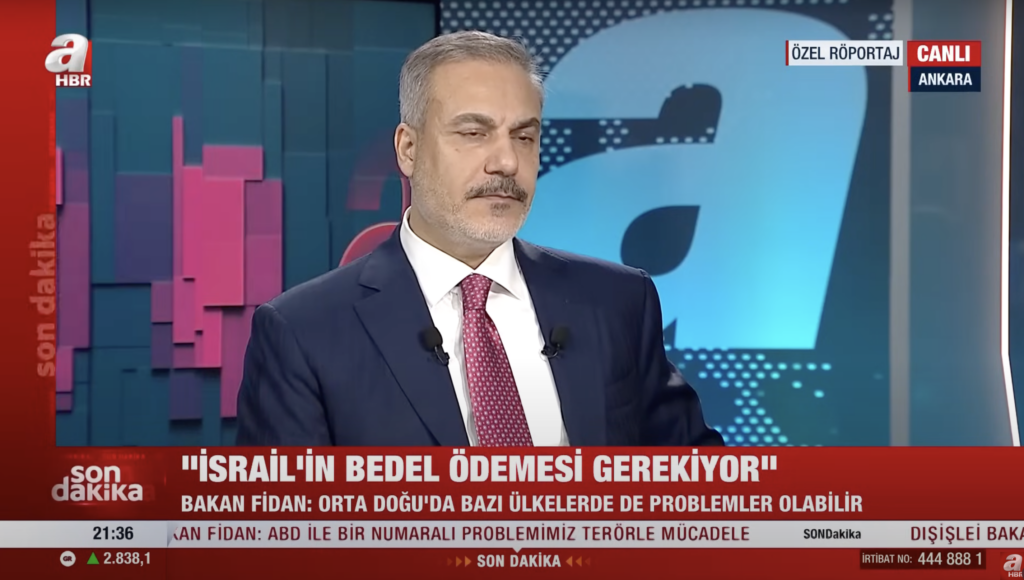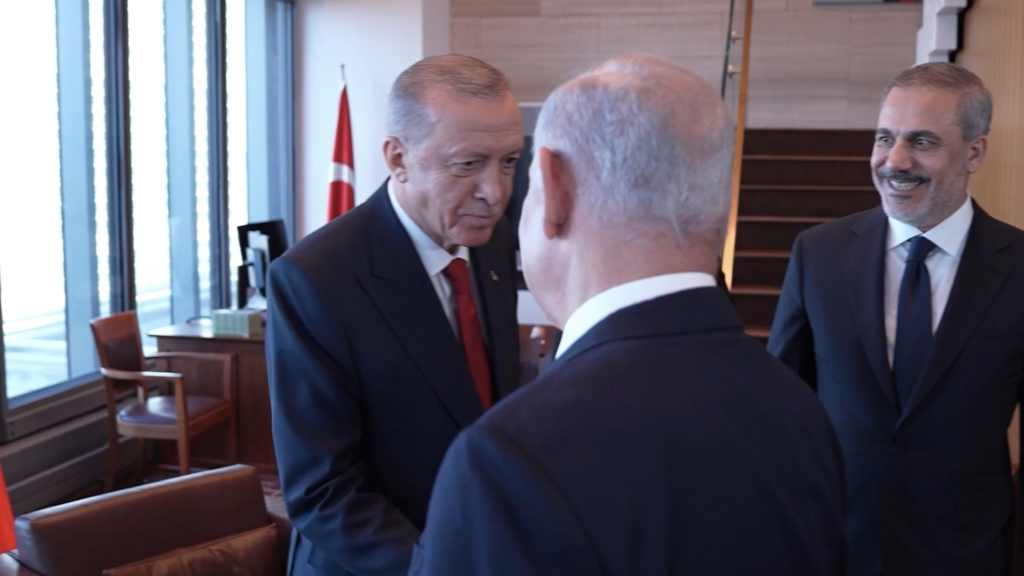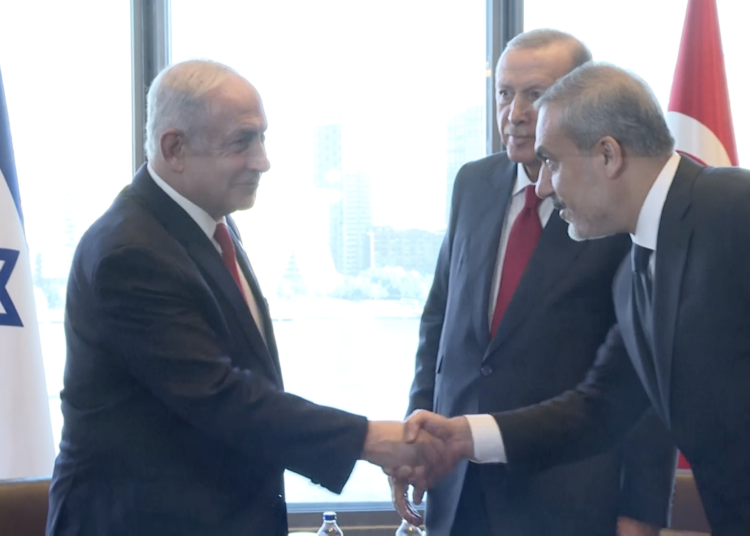Levent Kenez/Stockholm
Turkish Foreign Minister Hakan Fidan, during a November 15 interview broadcast on A Haber, a government-aligned television channel run by President Recep Tayyip Erdogan’s family, stated that he is “in a war” and has “no luxury to show feelings” when asked about his emotional response to the ongoing crisis in Gaza. Fidan also emphasized Turkey’s preparations for potential uncertainties under US President-elect Donald Trump’s second administration.
In the interview, which was filled with praise for Trump, Fidan issued a warning about the potential for broader conflict if meaningful consequences are not imposed on Israel and its supporters for their actions in Gaza. He emphasized, “Countries in the Middle East that fail to take necessary initiatives on this matter may face significant problems. There is substantial grassroots and public pressure, but unless a sufficient cost is incurred, there is no halt to these actions. This could lead to a larger war and widespread issues, both in the East and the West.”
Fidan addressed the ongoing situation in Gaza, condemning what he described as plans for the complete expulsion of Palestinians from the territory, their displacement to the Sinai Desert or Lebanon and the occupation of the West Bank. He added, “The process seems to be moving toward a point where, if there is no Palestine left, there will be no ‘Palestinian issue’ either.”
The minister highlighted that Israel and its backers continue their policies because they face little to no significant repercussions. “Unless they pay a political, military or economic price, they will persist,” he said. Fidan noted that, while key countries like Turkey and members of the Organization of Islamic Cooperation have taken clear stances, including Turkey’s decision to completely halt trade with Israel, such measures alone are largely symbolic and insufficient to stop what he described as genocide.

However, Fidan’s statement about halting trade with Israel does not fully reflect the reality. Ankara announced on April 9 that it would impose trade restrictions on Israel in response to the Gaza conflict. Critics argue that trade with Israel is simply being rerouted through Palestine and other third countries, effectively bypassing the embargo. Since trade restrictions on Israel were imposed in April, trade volume with Palestine has surged dramatically, raising doubts about the government’s narrative while providing needed income. This trend, many suggest, may be evidence that Turkey’s trade with Israel continues despite the official restrictions. According to foreign trade data released by the Turkish Exporters Assembly on November 2, Turkish trade with Palestine increased by 672 percent in October compared to the previous year, reaching a total of $95,406,250. The Erdogan government has still been criticized by pro-Palestinian groups for allowing the State Oil Company of the Republic of Azerbaijan (SOCAR) to transport Azerbaijani oil via pipelines to Turkey’s southern port of Ceyhan and subsequently ship it to Israel.
Fidan also pointed to other mechanisms where consequences might start to materialize, including shifts in elections in the West. “We saw the Palestinian issue play a role in the US elections. Traditionally, Muslim, Arab and [other] oppressed communities tend to support Democrats. This time, many leaned toward Republicans, punishing [what are seen as] double standards,” Fidan observed. He predicted similar developments in Europe, where he said such problems are likely to surface.
Fidan was also asked by one of the interviewers about his personal feelings regarding the harrowing reports emerging from Gaza. The journalist stated, “You have access to more information and are closer to the situation than we are. We hear about what’s happening in Gaza through the images and accounts we receive — thousands of children missing, women subjected to immoral treatment, and reports of Israeli soldiers burning people alive. As a father, how do you feel about this?”
He responded, “I am in a war. I do not have the luxury of showing my feelings.”
Hakan Fidan, a potential leader of the ruling party after President Erdogan, frequently makes statements aimed at appealing to the conservative and nationalist grassroots. During his time as head of the Turkish Intelligence Agency (MİT), Fidan cultivated a mysterious and hawkish image through MİT-supported troll social media accounts. As foreign minister, he seeks to maintain this image. Under Erdogan’s authoritarian leadership, MİT holds a central position in Turkey’s power structure. After the May 28, 2023 elections, Fidan was appointed by Erdogan to be foreign minister. While Erdoğan assigned Fidan to a prestigious role, he also ensured that Fidan’s influence was somewhat reduced. Fidan’s replacement at MİT was Erdoğan’s relative, İbrahim Kalın.

During the interview, Fidan also shared his predictions regarding the second term in office of US President-elect Trump. Fidan stated that Ankara had prior experience working with the Trump administration, emphasizing the personal rapport between Erdogan and Trump. “We worked together during Trump’s previous tenure, and our president had a strong personal relationship with Mr. Trump,” Fidan said. He added that this diplomatic advantage was used to address inherent challenges in bilateral relations. However, he acknowledged that leaders’ efforts could only go so far, as realities ultimately necessitate taking definitive positions.
Fidan noted that Turkey was moving forward based on lessons learned from Trump’s first term. He refrained from speculating on Trump’s future preferences or cabinet, explaining, “Drawing conclusions based on personal histories in politics often proves inconsistent. There is a saying: ‘Heavy lies the crown.’ We believe this principle will also apply here.” He stressed the importance of preparing for uncertainties and brainstorming alternative policy scenarios for a potential second Trump term.
Commenting on American foreign policy, Fidan claimed that over the years, US politics had established a pro-Israel equilibrium, which he said had become deeply embedded in Congress and the broader political environment. “Supporting Israel, even to the extent of advancing a Zionist agenda, has become almost a prerequisite in American politics,” he asserted. Fidan criticized the US approach, noting that under the Biden administration, events in Gaza had reached what he described as a level of genocide. He cautioned that similar adverse developments regarding Israel were likely during Republican administrations as well. “We hope Trump fulfills his promise not to start new wars, extending this commitment to the Palestinian issue,” he added.
Regarding US ties with the Kurdish forces in Syria, Fidan argued that these relationships were primarily justified by American interests in the region’s oil resources and Israel’s security. He remarked, “We have clearly communicated to our American counterparts that if there is a structure threatening Turkey, our fight will continue, even beyond our borders.” He emphasized that this approach marked Turkey’s shift from a defensive to a preventive strategy. “Other regional actors and countries need to understand our resolve,” Fidan said, insisting that Turkey’s actions were not about expansionism but about securing its national safety.












